

Puzzles and Brain Teasers. Problem-Solving Skills From MindTools.com. Got it! We use cookies to give you the best experience of our website. More on this. Cookie Consent plugin for the EU cookie law Subscribe to Our Newsletter Subscribe to Our Newsletter Receive new career skills every week, plus get our latest offers and a free downloadable Personal Development Plan workbook.
Read our Privacy Policy Browse Tools by Category Start Here (3) What Is Problem Solving? General Problem-Solving Tools (6) Problem-Solving Approaches (15) Finding the Cause of a Problem (9) Improving Business Processes (11) Diagram-Based Tools (3) Further Resources Bite–Sized Training (1) Decision Making Techniques and Skills from MindTools.com. Free Workbook Offer!
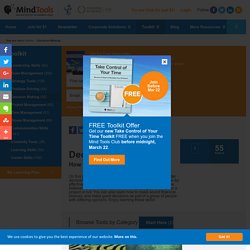
Find Out More JoinBefore Mar 22 FREE Toolkit Offer Get our new Take Control of Your Time Toolkit FREE when you join the Mind Tools Club before midnight, March 22. Loading... Got it! We use cookies to give you the best experience of our website. Cookie Consent plugin for the EU cookie law Get the Free Newsletter Get the Free Newsletter Learn new career skills every week, and get our Personal Development Plan Workbook FREE when you subscribe. Privacy Policy Browse Tools by Category Start Here (2) How to Make Decisions Making the Best Possible Choices 14 How Good Is Your Decision Making?
Decision Making Models (6) Choosing Between Options (9) Active Listening - Communication Skills Training from MindTools.com. Listening is one of the most important skills you can have.
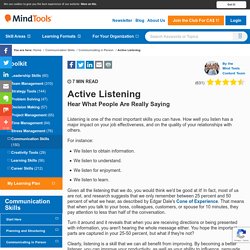
How well you listen has a major impact on your job effectiveness, and on the quality of your relationships with others. For instance: We listen to obtain information. We listen to understand. We listen for enjoyment. Listening Skills - The 10 Principles of Listening. Listening is the ability to accurately receive and interpret messages in the communication process.
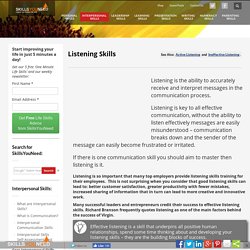
Listening is key to all effective communication, without the ability to listen effectively messages are easily misunderstood – communication breaks down and the sender of the message can easily become frustrated or irritated. If there is one communication skill you should aim to master then listening is it. Listening is so important that many top employers provide listening skills training for their employees. This is not surprising when you consider that good listening skills can lead to: better customer satisfaction, greater productivity with fewer mistakes, increased sharing of information that in turn can lead to more creative and innovative work. Many successful leaders and entrepreneurs credit their success to effective listening skills.
See our pages: Employability Skills and Customer Service Skills for more examples of the importance of listening in the workplace. Rachel Naomi Remen. Becoming a Critic Of Your Thinking. Learning the Art of Critical Thinking There is nothing more practical than sound thinking.
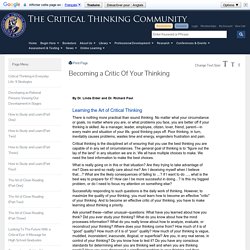
No matter what your circumstance or goals, no matter where you are, or what problems you face, you are better off if your thinking is skilled. How to Study and Learn (Part Four) In the previous three articles we focused on ideas for helping students improve their studying and learning habits.
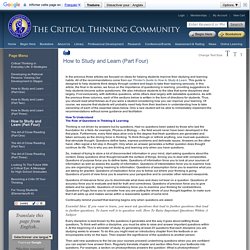
All of the recommendations come from our Thinker's Guide to How to Study & Learn. This guide is designed to help students think deeply through content and begin to take their learning seriously. In this article, the final in its series, we focus on the importance of questioning in learning, providing suggestions to help students become active questioners. We also introduce students to the idea that some disciplines deal largely, if not exclusively, with definitive questions, while others deal largely with debatable questions. As with the previous three columns, each of the sections below is written in the form of directions for students. How To Understand The Role of Questions in Thinking & Learning Thinking is not driven by answers but by questions.
How to Study and Learn (Part Three) In the previous two articles we introduced some of the intellectual skills, abilities, and dispositions essential to the development of the educated person as articulated in our Thinker's Guide for Students on How to Study and Learn.
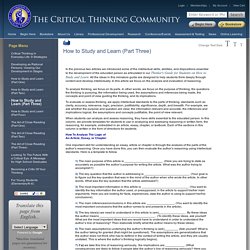
All the ideas in this miniature guide are designed to help students think deeply through content and develop intellectually. In this article we focus on the analysis and evaluation of reasoning. To analyze thinking, we focus on its parts. In other words, we focus on the purpose of thinking, the questions the thinking is pursuing, the information being used, the assumptions and inferences being made, the concepts and point of view guiding the thinking, and its implications. How to Study and Learn (Part Two) In part one of this article, we introduced some of the intellectual skills, abilities, and dispositions essential to the development of the educated person as articulated in our Miniature Guide for Students on How to Study and Learn.
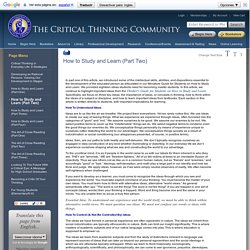
We provided eighteen ideas students need for becoming master students. How to Study and Learn (Part One) All thinking occurs within, and across, disciplines and domains of knowledge and experience, yet few students learn how to think well within those domains.
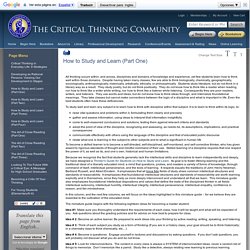
Despite having taken many classes, few are able to think biologically, chemically, geographically, sociologically, anthropologically, historically, artistically, ethically, or philosophically. Students study literature, but do not think in a literary way as a result. They study poetry, but do not think poetically. Active Reading Techniques.